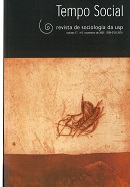The 60's generation: the weight of an inheritance
DOI:
https://doi.org/10.1590/S0103-20702005000200005Keywords:
60's generation, Experience and revolt, Political movements and counterculture, Inheritance transmissions, AffiliationsAbstract
The article aims at analyzing the excessive weight of the inheritance of the 60's generation over youth today. It focuses on the historicity of the movements of that decade, be it from the point of view of its affiliations, or of its non-homogeneity, with the objective of understanding the process that built the myth of the 1960's, over the years, and of the identity figuration of its generation, diluting the complexity, the heterogeneity, the conflicts, the inheritances and the historical contextualization of the movements. The identification of the later generations with the myth of the generation of the 60's, that has become manifest episodically, indicates the imprisonment of the younger generations by the image of a heroic identity of the previous generation. This points to an absence of a movement to separate the generations, and thus, of the production of a generational difference, and of the difficulties of receiving the inheritance, i.e., of the possibility of the making of a new affiliations.Downloads
References
BARBEY, Bruno et al. (1998), Mai 68 ou l’imagination au pouvoir – trente-huit photographies de Bruno Barbey – Deux cent soixante-dix-huit affiches. Paris, E.L.A. La Différence/Vence, Galerie Beaubourg.
BIRNBAUM, Norman. (1968), “O colosso que vacila”. In: LEFEBVRE, H. et al. A irrupção – a revolta dos jovens na sociedade industrial: causas e efeitos. São Paulo, Editora Documentos.
BROWN, Norman. (1972), Vida contra a morte: o sentido psicanalítico da história. (Trad. Nathanael Caixeiro) Petrópolis, Vozes.
CAMUS, Albert. (1997), O homem revoltado. (Trad. Valerie Rumjanek) Rio de Janeiro, Record.
CARDOSO, Irene. (2001), “68: a comemoração impossível”. In: Para uma crítica do presente. São Paulo, Editora 34.
DE CERTEAU, Michel. (1982), A escrita da história. (Trad. Maria de Lourdes Menezes) Rio de Janeiro, Forense Universitária.
DERRIDA, Jacques & ROUDINESCO, Elizabeth. (2004), “Escolher sua herança”. In: De que amanhã: diálogo/Jacques Derrida; Elizabeth Roudinesco. (Trad. André Telles) Rio de Janeiro, Jorge Zahar.
FOUCAULT, Michel. (1995), “O sujeito e o poder”. In: DREYFUS, Hubert & RABINOW, Paul. Uma trajetória filosófica: para além do estruturalismo e da hermenêutica. (Trad. Vera Porto Carrero) Rio de Janeiro, Forense Universitária.
GARCIA, Marco Aurélio. (1999), “Em busca de 1968”. In: GARCIA, Marco Aurélio & VIEIRA, Maria Alice (orgs.). Rebeldes e contestadores: 1968 Brasil, França e Alemanha. São Paulo, Perseu Abramo.
HAUG, Frigga. (1999), “O novo movimento feminista”. In: GARCIA, Marco Aurélio & VIEIRA, Maria Alice (orgs.). Rebeldes e contestadores: 1968 Brasil, França e Alemanha. (Trad. Simone Mello) São Paulo, Perseu Abramo.
KEHL, Maria Rita. (2004), “A juventude como sintoma da cultura”. In: NOVAES, Regina & VANNUCHI, Paulo (orgs.). Juventude e sociedade: trabalho, educação, cultura e participação. São Paulo, Perseu Abramo.
LEFEBVRE, Henri. (1968), “A irrupção: de Nanterre ao auge”. In: et al. A irrupção – a revolta dos jovens na sociedade industrial: causas e efeitos. São Paulo, Editora Documentos.
KRISTEVA, Julia. (2000), Sentido e contra-senso da revolta: (discurso direto) poderes e limites da psicanálise I. (Trad. Ana Maria Scherer) Rio de Janeiro, Rocco.
MANTEGA, Guido et al. (1979), Sexo e poder. São Paulo, Brasiliense.
MARCUSE, Herbert. (1967), A ideologia da sociedade industrial. (Trad. Giasone Rebuá) Rio de Janeiro, Zahar.
MARCUSE, Herbert. (1968), Eros e civilização: uma interpretação filosófica do pensamento de Freud. (Trad. Álvaro Cabral) Rio de Janeiro, Zahar.
MATOS, Olgária C. F. (1981), Paris 1968: as barricadas do desejo. São Paulo, Brasiliense.
MELMAN, Charles. (1992), Alcoolismo, delinqüência, toxicomania: uma outra forma de gozar. (Trad. Rosane Pereira) São Paulo, Escuta.
MORIN, Edgar. (1968), “La commune étudiante”. In: et al. Mai 1968: la brèche – premières réflexions sur les événements. Paris, Fayard.
ROSSANDA, Rossana. (1971), “Thèses sur l’enseignement”. In: et al. Il Manifesto: analyses et thèses de la nouvelle extrême-gauche italienne. Paris, Éditions du Seuil.
ROSZAK, Theodore. (1972), A contracultura: reflexões sobre a sociedade tecnocrática e a oposição juvenil. (Trad. Donaldson M. Garschagen) Petrópolis, Vozes.
TOURAINE, Alain. (1968), “La crise de l’université”. In: Le mouvement de mai ou le communisme utopique. Paris, Éditions du Seuil.
TRIGO, Maria Helena Bueno. (1997), Espaços e tempos vividos: estudo sobre os códigos de sociabilidade e relações de gênero na Faculdade de Filosofia da USP (1934-1970). Tese de doutorado, São Paulo, Faculdade de Filosofia, Letras e Ciências Humanas da Universidade de São Paulo.
Downloads
Published
Issue
Section
License
Copyright (c) 2015 Tempo Social

This work is licensed under a Creative Commons Attribution-NonCommercial 4.0 International License.


